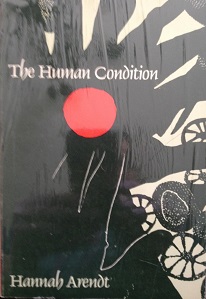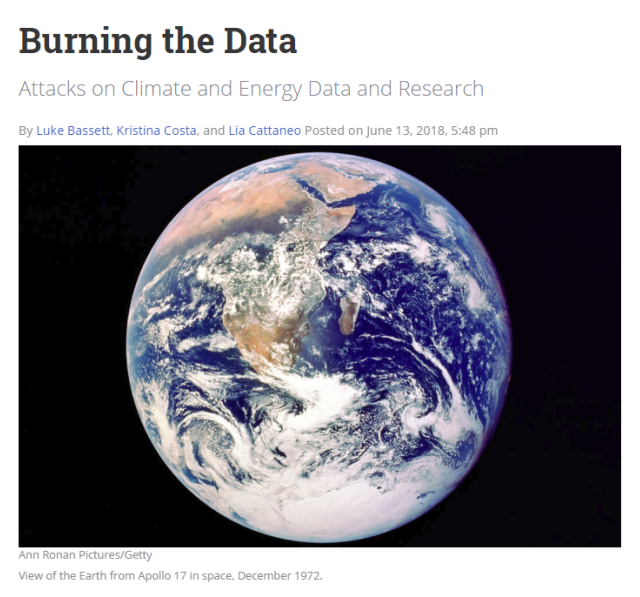File:Hannah Arendt.jpg

Original file (527 × 680 pixels, file size: 51 KB, MIME type: image/jpeg)
Bettmann Archive
Steve Schmidt / GreenPolicy360 Siterunner: The year 1974 is a period during my 20s when I was working during the day as a book editor/exec in New York City and at night studying at the Graduate Faculty of the New School and Hannah Arendt was one of our professors and one of the reasons I chose to attend and interact intellectually with the distinguished professors. Hannah's books, especially The Human Condition, were centers of the 'History of Ideas' curriculum and her thoughts on authoritarianism and how it can take hold of a nation were memorable, powerful ideas as she spoke of the conditions in Germany leading to World War II.
Today in the United States a wave of authoritarianism, loss of credibility in news, and political extremism is bringing threats to democracy and the republic that should recall the conditions Hannah Arendt spoke of for years in her work and focused in on shortly before her death in the mid 1970s.
Totalitarianism
Totalitarianism begins in contempt for what you have. The second step is the notion: “Things must change—no matter how, Anything is better than what we have.” Totalitarian rulers organize this kind of mass sentiment, and by organizing it articulate it, and by articulating it make the people somehow love it. They were told before, thou shalt not kill; and they didn’t kill. Now they are told, thou shalt kill; and although they think it’s very difficult to kill, they do it because it’s now part of the code of behavior. They learn whom to kill and how to kill and how to do it together. This is the much talked about Gleichschaltung—the coordination process. You are coordinated not with the powers that be, but with your neighbor—coordinated with the majority. But instead of communicating with the other you are now glued to him. And you feel of course marvelous. Totalitarianism appeals to the very dangerous emotional needs of people who live in complete isolation and in fear of one another.
Hannah Arendt - If, everybody lies to you, if everybody always lies to you, the consequence is not that you believe the lies, but rather that nobody believes anything any longer…And a people that can no longer believe anything, cannot make up its mind. It is deprived, not only of its capacity to act, but also of its capacity to think and to judge. And with such a people, you can then do what you please.
Loss of a Free Press and 'You Get a Great Number of Lies'
The moment we no longer have a free press, anything can happen. What makes it possible for a totalitarian or any other dictatorship to rule is that people are not informed; how can you have an opinion if you are not informed? If everybody always lies to you, the consequence is not that you believe the lies, but rather that nobody believes anything any longer. This is because lies, by their very nature, have to be changed, and a lying government has constantly to rewrite its own history. On the receiving end you get not only one lie—a lie which you could go on for the rest of your days—but you get a great number of lies, depending on how the political wind blows. And a people that no longer can believe anything cannot make up its mind. It is deprived not only of its capacity to act but also of its capacity to think and to judge. And with such a people you can then do what you please.
○
October 14, 2020
Emily Haber @GermanAmbUSA
German Ambassador to the US
····································································································
From GreenPolicy360:
One of her many legacies: Totalitarianism can flourish where people systematically refuse to engage with reality, and are ready to replace reason with ideology and outright fiction.
Re: the 'Transformation of Facts Into Opinions'
Everyone does not have a right to his ignorance under the pretext that everyone has right to his opinion
Perhaps the most striking and frightening aspect of the German flight from reality is the habit of treating facts as though they were mere opinions. For example, the question of who started the last war, by no means a hotly debated issue, is answered by a surprising variety of opinions. An otherwise quite normally intelligent woman in Southern Germany told me that the Russians had begun the war with an attack on Danzig; this is only the crudest of many examples. Nor is this transformation of facts into opinions restricted to the war question; in all fields there is a kind of gentlemen’s agreement by which everyone has a right to his ignorance under the pretext that everyone has a right to his opinion—and behind this is the tacit assumption that opinions really do not matter. This is a very serious thing, not only because it often makes discussion so hopeless (one does not ordinarily carry a reference library along everywhere), but primarily because the average German honestly believes this free-for-all, this nihilistic relativity about facts, to be the essence of democracy. In fact, of course, it is a legacy of the Nazi regime.
— Hannah Arendt, "The Aftermath of Nazi Rule — Report from Germany" Commentary, Oct 1950
○
GreenPolicy360 / Steven Schmidt:
Your GreenPolicy siterunner studied with the Graduate Faculty of the New School for Social Science. While I worked for years in New York publishing, I read, discussed and debated, wrote and carried on an old intellectual tradition at the university that in many ways carried on the European liberal studies tradition. Our faculty was, in many regards, academically famous and professors/authors such as Hannah Arendt and Robert Heilbroner kept my mind engaged as I read hundreds of classics over the years, including "The Wealth of Nations". Although I focused on "political economy", I ranged wide over the history of ideas.
These days I think more and more about Hannah Arendt and her lessons.
On the Origins of Authoritarianism stands out, here on my bookshelf, and in our modern times.
The threats of autocracy are real and growing, with dis- and mis-information wielded, a cyberpolitics and cyberwarfare of manipulation, of big lies and big lies repeated until believed. An onslaught of online opinion, diversions and advertising aiming for eyeballs and clicks, metrics that can be monetized are interspersed with state of the art marketing techniques pushing a breakdown of civility and common purpose.
As Hannah wrote of it in earlier times, opinions are not facts, but democracy is threatened when opinions reject facts.
It's a good time for an upclose look at the work of Hannah Arendt.
○
Steven J. Schmidt in Eco-nomics
In the 1970s, as a young editor at a NY publishing and printing company, I took three years at nights to immerse myself in a History of Ideas / Political Economy program at the Graduate Faculty of the New School, the New School for Social Research.
Hannah Arendt was there when I arrived in the city and her reputation and the university's reputation as a "University in Exile" originally having attracted some of the top European liberal scholars in the world spoke to me of deep thinking.
Professors like Robert Heilbroner and David Gordon opened new vistas of thought as we introduced and debated capitalism versus new forms of economics that could begin to address conflicts and contradictions within capitalism. The legacy of world wars and the Vietnam war loomed in the rear-view mirror and the nuclear weapons brink of "mutually assured destruction" as the central strategic policy of the "Cold War" mentality loomed in pervasive form.
From Climate Problems, Climate Solutions
Perhaps it is human nature to be overwhelmed, or what my teacher Hannah Arendt described in her book The Human Condition as the realms of labor, work, and action. Many choose to go along to get along, and not act when the threats grow extreme, even existential. But to those who take the chance to make a difference and stand up and do your best to make changes that change the world for the better, I salute you for your bravery.
○
It has frequently been noticed that the surest long-term result of brainwashing is a peculiar kind of cynicism – an absolute refusal to believe in the truth of anything, no matter how well this truth may be established. In other words, the result of a consistent and total substitution of lies for factual truth is not that the lies will now be accepted as truth, and the truth be defamed as lies, but that the sense by which we take our bearings in the real world – and the category of truth vs. falsehood is among the mental means to this end – is being destroyed. And for this trouble there is no remedy. It is but the other side of the disturbing contingency of all factual reality. Since everything that has actually happened in the realm of human affairs could just as well have been otherwise, the possibilities for lying are boundless, and this boundlessness makes for self-defeat. Only the occasional liar will find it possible to stick to a particular falsehood with unwavering consistency; those who adjust images and stories to ever-changing circumstances will find themselves floating on the wide-open horizon of potentiality, drifting from one possibility to the next, unable to hold on to any one of their own fabrications. Far from achieving an adequate substitute for reality and factuality they have transformed facts and events back into the potentiality out of which they originally appeared. And the surest sign of the factuality of facts and events is precisely this stubborn thereness, whose inherent contingency ultimately defies all attempts at conclusive explanation. The images, on the contrary, can always be explained and made plausible – this gives them their momentary advantage over factual truth – but they can never compete in stability with that which simply is because it happens to be thus and not otherwise. This is the reason that consistent lying, metaphorically speaking, pulls the ground from under our feet and provides no other ground on which to stand.
— Hannah Arendt, Truth and Politics, The New Yorker, Feb 25, 1967
○
Disinformation - Online - Dangerous
○
Additional Arendt Thoughts:
○ "The ideal subject of totalitarian rule is not the convinced Nazi or the dedicated communist, but people :for whom the distinction between fact and fiction, true and false, no longer exists." -- Hannah Arendt, :"The Origins of Totalitarianism" (1951)... and lecture at the Graduate Faculty of the New School for :Social Research, NYC, 1973
"The Right to Have Rights"
"Banality of Evil"
"Political Theology 2.0"
"Witness History"
"Arendt accordingly devoted considerable energy in her final years to exposing the consolidation of state power here in the US..."
"The political theorist who wrote about the Nazis and ‘the banality of evil’ in the 60s has become a surprise bestseller (2017)"
File history
Click on a date/time to view the file as it appeared at that time.
| Date/Time | Thumbnail | Dimensions | User | Comment | |
|---|---|---|---|---|---|
| current | 19:26, 14 October 2020 |  | 527 × 680 (51 KB) | Siterunner (talk | contribs) |
You cannot overwrite this file.
File usage
The following 7 pages use this file:
- GreenPolicy360 Archive Highlights 2020
- Green Stories of the Day - GreenPolicy360 Archive
- In Defense of Democracy and Freedom
- File:Hannah Arendt warns us.jpg
- File:The Human Condition - Hannah Arendt.jpg
- File:Totalitarianism in the Age of Trump, Lessons from Hannah Arendt.png
- Category:Strategic Demands


